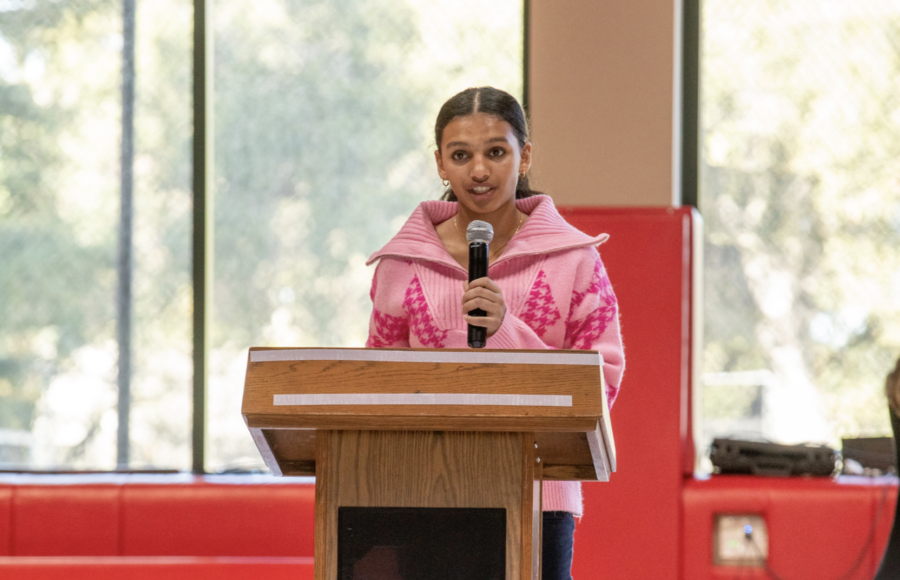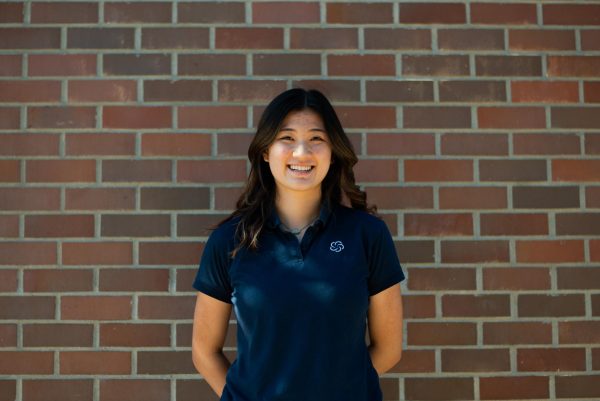On May 10, Castilleja’s student body elected Araika Ramchandran ‘25 as the inaugural DEIJ (Diversity, Equity, Inclusion, and Justice) Coordinator, an ASB position she spent over three years fighting to establish. Today, she sat down with Counterpoint to discuss how she transformed her idea into an official role, her hopes for diversity initiatives at Castilleja, and how students can lead administrative change.
What first inspired you to start fighting for the DEIJ Coordinator position, and how did you turn your idea into a proposal?
“It started in 2020. While we were in the midst of COVID-19, we were lucky enough to have school still happening because of Castilleja’s resources. However, in that period of time, we were all quarantined. But we were witnessing huge amounts of cases of discrimination happening all over the United States, such as [the murder of] George Floyd, which was the one that got publicized. But there are hundreds behind his case that didn’t get media attention. And so that happening in the United States kind of forced me to think about [Castilleja’s response]. I knew for a fact that there were communities within Castilleja that would’ve appreciated more support and the ability to acknowledge what they were going through, as their community was being unfairly targeted.
So essentially, I was like, ‘Okay, there’s a gap here, right?’ The student body needs something. And Castilleja is not providing that. So why is there a gap? How do we bridge that connection? That was the question that I was kind of going into this process with.
And then I got invited to participate on a student-led anti-racism policy board called Lead the Engagement for Anti-Racism Now (LEARN) commission. On the commission, they basically gave me the tools to start a proposal. We had a couple of open conversations about what was happening with Castilleja at school and how I was struggling with the fact that we weren’t acknowledging what was happening in our broader communities. So through LEARN, I was able to take a longer time researching and developing my ideas on what is the solution to this gap, this lack of communication between the student body and the faculty. I spent 2020 and 2021 researching other schools’ diversity systems. Menlo School has a successful Student Diversity Officer position in their student government, which is where the idea stemmed from.”
What did the proposal process look like?
“There were monthly meetings with Dr. Johnson—she was the closest thing we had to the anti-racism director at the time—Ms. Rubin, and even Mrs. Kauffman. The whole process was summarized in a pitch meeting with admin, so we had an admin in on that meeting, like Ms. Cameron, Ms. Gwin, Ms. Rubin, Ms. Kauffman—essentially every person of extreme significance, and honestly, power on this campus was in that meeting. And I was essentially presenting the proposal to them as a pitch process.
My goal for that meeting was to get them to approve the original DEIJ Coordinator position, which would have been responsible for talking about events, like acts of discrimination and diversity progress, at Upper School meetings. They would be responsible for making sure that everyone’s holidays and cultures were being represented at Castilleja, working with affinity groups, and ensuring that ASB’s actions were diverse and inclusive. Something that was in the original proposal for a DEIJ Coordinator was creating a calendar that listed different holidays and cultural events for communities on campus. That calendar is part of the DEIJ Coordinator’s role for next year, so that’s a very tangible part that actually made it through three years of implementation.
What challenges did you run into?
“One of the biggest challenges would be learning how to communicate with the administration of a larger organization. In this case, it was a school. I had to learn how to align my goals, my wants, and my needs, with the goals and long-term plans of the administration. It was difficult to figure out the middle ground so that both the student perspective is heard, and that the student hears the adult perspective. It’s a two-way street, because even if the student body feels like Castilleja administration doesn’t hear us, oftentimes, we also don’t listen to them.
It required a lot of accepting that there were things that they couldn’t tell me. And there were initiatives that I didn’t know about. And time would pass before I was clued into the conversation. Confidentiality was a big thing I had to take into consideration when working with adults. From a student perspective, it may seem like things aren’t happening and change isn’t happening. However, I’ve found that oftentimes, there’s a lot that goes on behind the scenes, but the administration can’t tell me everything about what they’re doing in terms of increasing their commitment to DEIJ all the time.
The main purpose of the diversity officer was to kind of ease that tension, so that when administration comes up at Upper School meeting and says, ‘Hey, we have a lot of plans in terms of DEIJ, and we’re so excited like to get them in place, but we can’t tell you until three months from now,” the goal is that the student body can trust that the administration is working as hard as possible to support the community. And when a student voices a concern, the administration is able to take that concern seriously and provide a tangible solution. It’s about a balance of trusting that there’s work that’s being done, and also making sure that there is some sort of student representation in that work, so that students don’t feel like it’s a fully closed door.”
What has been the most fulfilling aspect of the process for you?
“There are quite a few. So the first one would be getting to that pitch meeting and getting through it. Until I finished talking and my piece was said, I had no idea how they would react, but the support I received in that meeting was overwhelming. The conversation actually surrounded, ‘How do we make this happen?’ rather than ‘Should we make this happen?’ We finally got people of importance to Castilleja in the same room to hear this pitch and give it serious thought and discussion.
The second one would be when Ms. Nguyen reached out to me after reading my proposal and was like, ‘We should talk about this, I’m so excited to hear more about this.’ And right off the bat, I knew that she was the right fit for our school and that she was going to accomplish great things. I mean, the fact that it took her maybe like, one day of being in this new position to already start thinking about how we can create change and better Castilleja’s community, that was huge for me.
The final moment was getting the ASB election signup sheet, and seeing ‘DEIJ Coordinator’ on the bottom of it, because once that email is sent out, like, there was no more revising it, there was no more taking it back. It’s there. The whole student body can see it, the whole administration can see it, like it’s happening. I would say that was the biggest like, ‘Okay, I can breathe, it’s done. It’s there.’
It was a process and I’m beyond ecstatic to see us go from kind of a defensive, closed-minded perspective on both sides—student body and faculty side—and gradually move to a collaborative space where we’re working together instead of against each other. Up until the beginning of last school year, there was not a single person in Castilleja that was dedicated to DEIJ. And I think that speaks volumes to what we prioritized as a community. That being said, I think that this year speaks even greater volumes about what we can do as a community when we feel like change is needed. We’ve done a complete 180 as a school community, to go from DEIJ always being on the back burner to being a forefront priority that the student body constantly sees as being recognized.”
What are your hopes for the DEIJ Coordinator role this year?
“I would love to see more collaboration between student leadership hubs like ASB, the DEILC, affinity groups, and ACE organizations. I see a lot of crossovers for us to be in a place where we are collaborating to extend and implement each other’s ideas and visions. So my hope is, with the DEILC in place, and the DEIJ Coordinator, we will never lose that hump of innovation and change-making. I’m so proud because the DEILC and the DEIJ Coordinator mean that students will always have a place to go to if they have concerns and there will always be a place to make change. What I envision with that is, in like let’s say two or three years, students have very, very permanent and active collaborations with faculty, with student government, with ACE organizations, with affinity groups. Those are ongoing collaborations so that we’re not only bettering our community, but we are finding ways to solve problems in our outside communities.
For example, one of the ACE organizations this year is considering focusing on immigration policy. Immigration policy covers diversity and anti-racism, so collaboration between that ACE organization, the DEILC, and the Youth Vote Coalition would be a partnership that would allow this one ACE org to not only keep in mind diversity and inclusivity, but to also consider political solutions, such as a letter of recommended action, as ways to create change regarding immigration policy. Currently, I see a lot of really, really driven students working to create change, but they’re working separately instead of together.”
As someone successful in proposing an idea to Castilleja administration, do you have any advice for students who have issues that they want the school to address?
“I think it’s really important for students to step up and speak up. Stepping up means acknowledging that there’s a problem and taking the time to develop an awareness of the issue. In my case, that was conducting student surveys and interviewing over 100 students as to what DEIJ meant to them, throughout both private and public schools in the Bay Area. Once you develop that awareness, you’re able to speak up on the issue because you have the knowledge and experience you need to accurately back up your proposal. So, make sure you’re very clear as to what issue you’re trying to solve, and how you plan to solve it. Take the time, make sure that there’s a support system behind it, and make sure that there are other people who also acknowledged this problem in addition to yourself.
And honestly, Castilleja has become an environment where if a student has an issue that they want to speak up about, they have every right and every capability to. There are so many adults who are happy to be resources and happy to assist you in that process. So, my advice would be don’t hesitate. Just make sure to develop awareness before action: awareness without action is incomplete, and action without awareness is irresponsible.”



